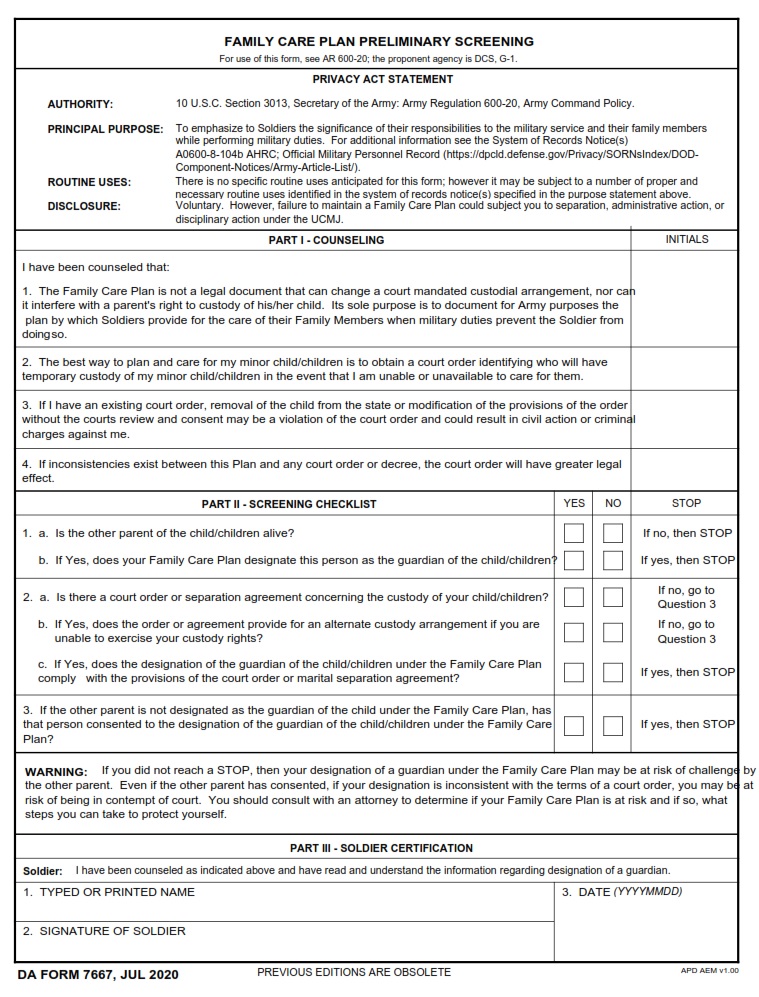DAFORMFILLABLE.COM | DA FORM 7667 Fillable – Army Pubs 7667 PDF – DA FORM 7667 – Family Care Plan Preliminary Screening is a crucial document used by the U.S. Army to ensure that all soldiers with dependents have a comprehensive and executable plan in place for the care of their family members. This form is particularly important for soldiers who may be deployed or otherwise unavailable to care for their families due to military obligations.
DA FORM 7667 – Family Care Plan Preliminary Screening
| Form Number | DA FORM 7667 |
| Form Title | Family Care Plan Preliminary Screening |
| Form Date | 7/1/2020 |
| Form Proponent | G-1 |
Overview of DA FORM 7667
Pub/Form Number and Date
- Pub/Form Number: DA FORM 7667
- Pub/Form Date: 07/01/2020
The most recent version of DA FORM 7667 was published on July 1, 2020. This update replaced the previous version dated September 1, 2009.
Pub/Form Title and Proponent
- Pub/Form Title: FAMILY CARE PLAN PRELIMINARY SCREENING
- Pub/Form Proponent: G-1
The title clearly indicates the purpose of the form, which is to screen and establish a preliminary family care plan. The form is managed by the G-1, the personnel office of the Army.
Key Aspects of DA FORM 7667
Form Status and Prescribing Directive
- Pub/Form Status: ACTIVE
- Prescribed Forms/Prescribing Directive: AR 600-20
As an active form, DA FORM 7667 is currently in use and must be completed as per the guidelines outlined in AR 600-20, which is the Army regulation covering the Army Command Policy.
Privacy and Security
- Footnotes: 14-REQUIRES PRIVACY ACT STATEMENT (AR 340-21)
- Security Classification: UNCLASSIFIED
- Dist Restriction Code: A APPROVED FOR PUBLIC RELEASE; DISTRIBUTION IS UNLIMITED
The form requires a privacy act statement to ensure that the personal information provided is protected under AR 340-21. It is classified as unclassified, meaning it does not contain sensitive information that requires restricted access.
Purpose and Importance of DA FORM 7667
Family Care Plan Necessity
The Family Care Plan is essential for soldiers with dependents, including single parents, dual-military couples with dependents, and those responsible for adult family members who cannot care for themselves. The preliminary screening helps identify potential issues and ensures that soldiers have a solid plan in place before deployment or other assignments that may take them away from their dependents.
Components of a Family Care Plan
A comprehensive Family Care Plan includes:
- Designated caregivers: Individuals who will take responsibility for the dependents.
- Legal documentation: Powers of attorney, wills, and any other necessary legal documents.
- Financial arrangements: Access to funds to support the dependents during the soldier’s absence.
- Medical care: Information about medical providers and consent forms for medical treatment.
Filling Out DA FORM 7667
Required Information
To complete DA FORM 7667, soldiers must provide detailed information about their dependents, designated caregivers, and the arrangements made to ensure their care. This includes:
- Personal information: Names, addresses, and contact information of dependents and caregivers.
- Legal arrangements: Copies of legal documents such as powers of attorney and wills.
- Emergency contacts: Individuals who can be contacted in case of an emergency.
- Special instructions: Any specific needs or instructions related to the care of the dependents.
Submission and Approval
Once completed, DA FORM 7667 must be submitted to the soldier’s chain of command for review and approval. The chain of command ensures that the plan is feasible and that all necessary arrangements are in place. Regular updates and reviews of the Family Care Plan are required to address any changes in circumstances.
Conclusion
DA FORM 7667 – Family Care Plan Preliminary Screening is a vital tool for ensuring that soldiers’ dependents are well cared for in their absence. By understanding the requirements and carefully completing the form, soldiers can have peace of mind knowing that their family members will be taken care of, allowing them to focus on their duties. The form’s structured approach to gathering necessary information and securing appropriate arrangements underscores its importance in the overall readiness and welfare of Army personnel and their families.
